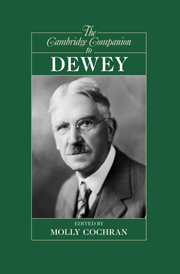Book contents
- Frontmatter
- Introduction
- 1 The making of a democratic philosopher: the intellectual development of John Dewey
- 2 Dewey’s epistemology
- 3 The naturalism of John Dewey
- 4 Dewey’s logic of inquiry
- 5 The primacy of practice in Dewey’s experimental empiricism
- 6 Cognitive science and Dewey’s theory of mind, thought, and language
- 7 John Dewey and action
- 8 Dewey’s moral philosophy
- 9 Ethics as moral inquiry: Dewey and the moral psychology of social reform
- 10 Dewey and pragmatic religious naturalism
- 11 Dewey’s aesthetics
- 12 Dewey’s philosophy of education: a critique from the perspective of care theory
- 13 Dewey’s vision of radical democracy
- 14 Dewey as an international thinker
- Bibliography
- Index
13 - Dewey’s vision of radical democracy
Published online by Cambridge University Press: 28 September 2010
- Frontmatter
- Introduction
- 1 The making of a democratic philosopher: the intellectual development of John Dewey
- 2 Dewey’s epistemology
- 3 The naturalism of John Dewey
- 4 Dewey’s logic of inquiry
- 5 The primacy of practice in Dewey’s experimental empiricism
- 6 Cognitive science and Dewey’s theory of mind, thought, and language
- 7 John Dewey and action
- 8 Dewey’s moral philosophy
- 9 Ethics as moral inquiry: Dewey and the moral psychology of social reform
- 10 Dewey and pragmatic religious naturalism
- 11 Dewey’s aesthetics
- 12 Dewey’s philosophy of education: a critique from the perspective of care theory
- 13 Dewey’s vision of radical democracy
- 14 Dewey as an international thinker
- Bibliography
- Index
Summary
We tend to forget that the word “democracy” has had a negative connotation through most of its long history. The Greek word demokratia means rule by the demos, the populace, the common people. For centuries, there has been a fear that the unchecked rule by the people would be anarchic and turn into tyranny. The Founding Fathers of the United States did not think of themselves as creating a democracy, but rather a new republic. The elaborate system of checks and balances, as well as the Bill of Rights, were intended to counter the abuses of unrestrained democracy. Only in the nineteenth century did the word “democracy” begin to take on a positive connotation, although Alexis de Tocqueville - the most perceptive commentator on American democracy - warned about the many dangers that it confronted. And John Stuart Mill, the great liberal thinker, was worried about the tendency of democratic societies to foster mediocrity. There has always been an undercurrent, even by champions of democracy, that it is neither viable nor desirable to think that a workable democracy can involve the active participation of all the people. Today, the word “democracy” has such a positive aura, and elicits such a powerful emotional response, that we rarely think about what we really mean by democracy.
- Type
- Chapter
- Information
- The Cambridge Companion to Dewey , pp. 288 - 308Publisher: Cambridge University PressPrint publication year: 2010
- 14
- Cited by

